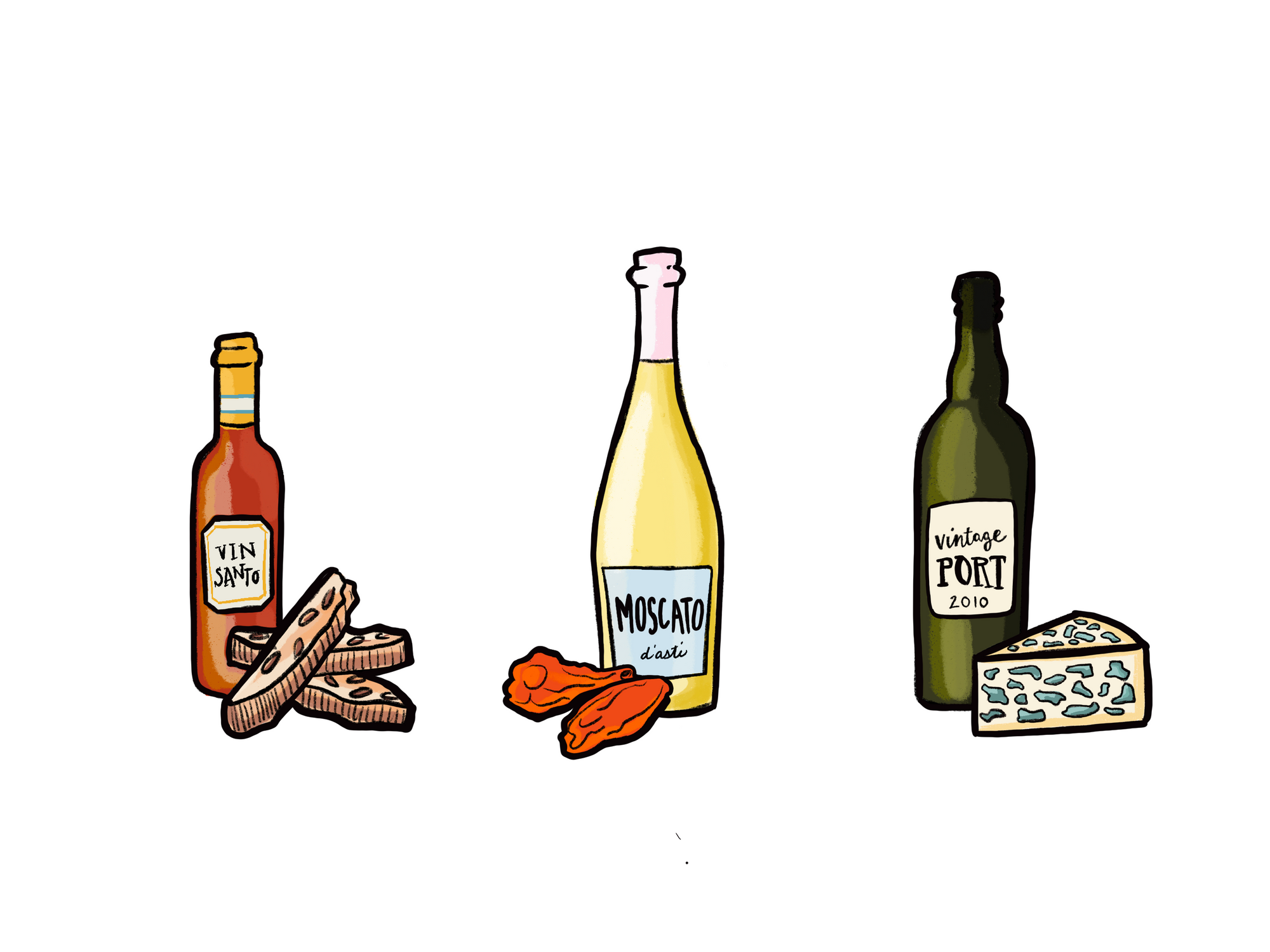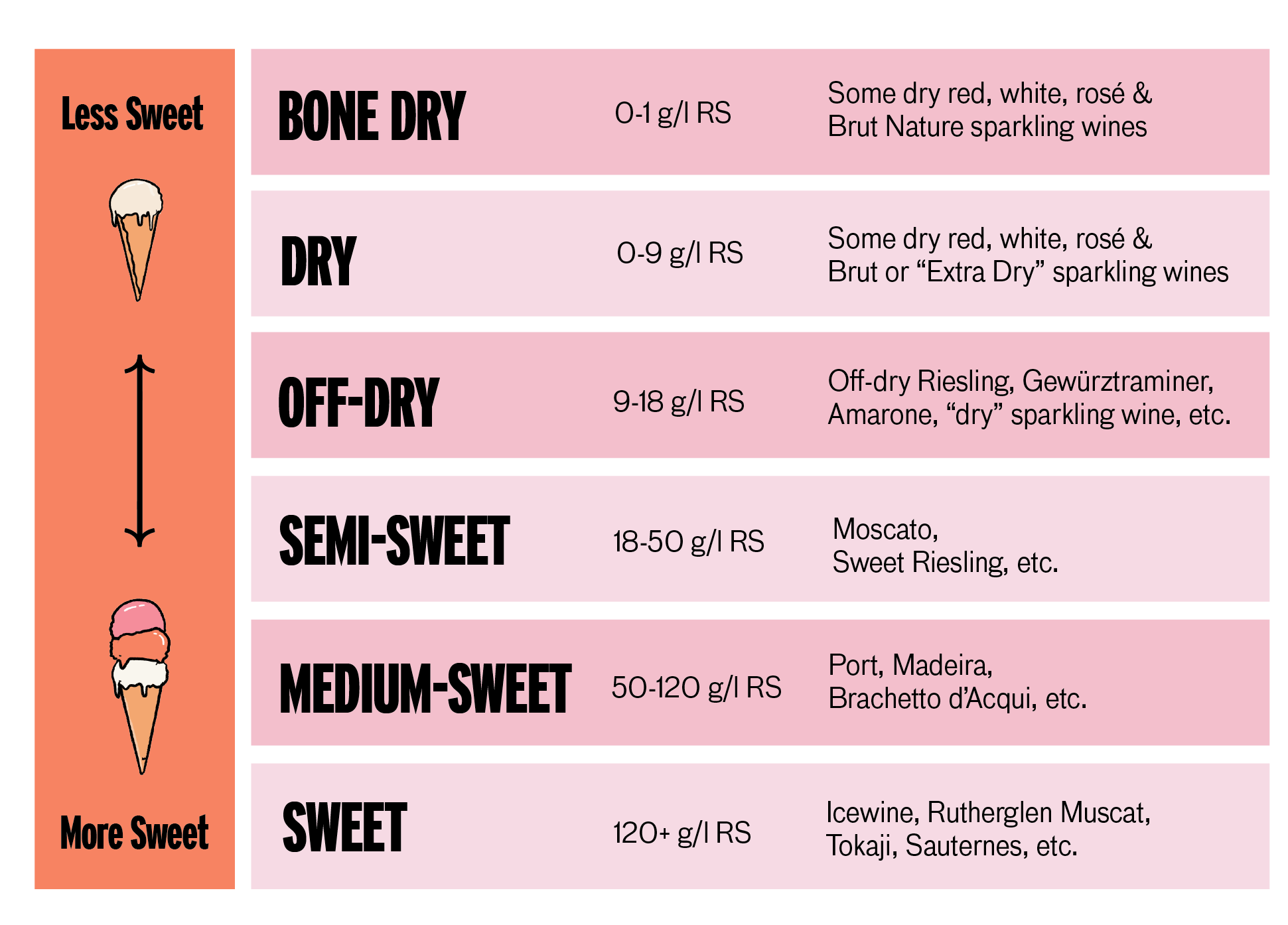

How much sugar a wine has in it.
TL;DR--plum
The sweetness of a wine is simply how many grams of sugar remains in the wine after fermentation (aka, residual sugar or “RS”). Sugar can also be added to a wine after fermentation, however, this typically only occurs in lower quality bulk wines as a means to make the wine more palatable or sometimes even mask unwanted flavours.
The sweetness of a wine is measured on a scale of bone-dry (no sugar) to sweet (lots of sugar!).
How to detect sweetness--red
Sweetness in wine tastes... well, sweet of course! But not all wines that “taste” sweet are sweet. Sometimes very ripe fruit flavours in a wine can make the wine seem sweet even if the wine is dry (aka, not sweet). To determine if a wine is sweet, instead of just having sweet ripe fruit flavours, lick your lips after sipping the wine. If your lips are a bit sticky or taste sweet, there's likely some sugar in the wine!
Sweetness contributes to the wines flavour profile and body. Did you know that elevated levels of acidity can mask the sweetness of a wine? Likewise, wines that are sweet can mask the acidity of a wine!

How does a wine become sweet?--aromatic
All wines are made from grapes, that have naturally occurring fruit sugars. It's the transformation of these sugars into alcohol via the magic of fermentation that results in wine. A wine without any sugar is referred to as dry. But sometimes, not all the sugars from the grape are transformed into alcohol, and so the resulting wine can achieve varying degrees of sweetness. Sometimes, this is a deliberate act like for dessert wines, moscato etc. Other times, the yeast who are eating the sugar simply run out of energy and give up. So we will have particularly fruity red wine that isn't quite dry, or maybe a white wine that is just a bit too fruity. These are referred to as off-dry.
Pairing with sweetness--racy
Sweet wines have great pairing potential and can be a real saviour when it comes to some hard-to-pair situations where dry wines struggle to deliver.
Think of all the flavour combos with sweetness we already love like sweet & salty, sweet & sour and sweet with sweet! Sweetness works wonders with chilli heat too. This is because sugar is a powerful force against burning mouths as it absorbs a lot of the capsaicin (the spicy stuff in chilli responsible for the burning). This is something the best spicy food-eating cultures have known for centuries. At the top restaurants in Bangkok when the uninitiated aren’t ready for the heat and start to cry from their burning tongues, they will treat you with slices of apple coated in sugary syrup.
Okay, so where does wine come in?
A slightly sweet wine such as an off-dry Riesling has some of the natural sugar from the grapes left over from fermentation (RS). The winemakers will stop the fermentation process before all the sugar is converted into alcohol (the process for completely dry/non-sweet wines). This residual sugar dulls the heat, allowing you to taste the underlying flavours in the food.
And as a bonus, the wine no longer tastes as sweet, so it’s a winner even for people who don’t like sweet wines.
Some other must-try sweet pairings are
Sweet & Salty: Port with Blue Cheese
Sweet & Fatty: Sauternes with Foie Gras, Bacon-wrapped scallops with Marsala
Sweet & Sweet: Tawny Port and apple pie, Vin Santo and biscotti, Icewine and ice cream, Chocolate Covered Strawberries with Brachetto d’Acqui
Sweet & Spicy: Moscato and hot wings

How sweetness is measured--aromatic
Sweetness is measure by how much RS is in the wine.
There are different terms used to indicate how much sweetness is in the wine, ranging from bone dry (no sugar!) sweet (loads!)

How sweetness affects a wine's aging potential--cellar
Sweet and fortified wines are some of the best wines for long term aging!
Sugar has been used as a preservative for a long time. Take jam for example, it's just fruit with added sugar so that the fruit can be preserved! The same concept applies to dessert wines with high sweetness levels. Sweet wines also often are treated with more sulphur before bottling. This is because the sugars left in wine can be more prone to microbial spoilage.
As sweet wine ages, the sweetness does not dissipate. We hope to age the same ;)
Do you know your wine personality? If your answer is no, take our quiz to find out which wines to pick up next and build your box!
Build my box





